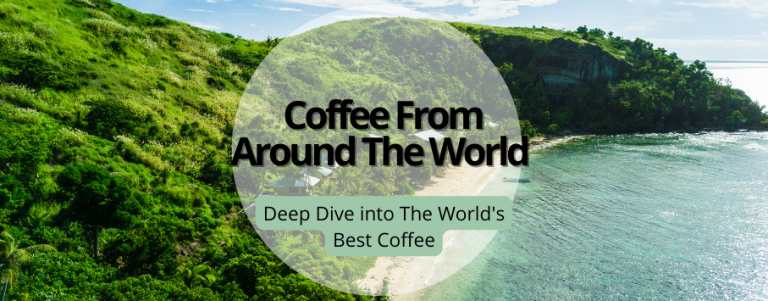Your cart is currently empty!
Jamaican Blue Mountain Coffee: The World’s Most Prestigious Brew
Introduction
When coffee lovers speak of the most luxurious and refined coffees in the world, Jamaican Blue Mountain Coffee is always part of the conversation. Grown at extreme elevations in one of the most unique microclimates on Earth, this legendary bean offers a smooth, well-balanced cup that’s hard to rival.
In this guide, we’ll explore what makes Jamaican Blue Mountain Coffee so special — from its origin and flavor profile to its strict certification and global demand.
TLDR: Jamaican Blue Mountain Coffee at a Glance
- Origin: Grown in the Blue Mountains of eastern Jamaica at elevations up to 7,500 ft
- Flavor Profile: Exceptionally smooth, mild acidity, full body, with notes of chocolate and floral undertones
- Exclusivity: One of the most rare and expensive coffees in the world due to limited supply and strict certification
- Certification: Regulated by the Jamaica Agricultural Commodities Regulatory Authority (JACRA)
- History: Introduced in 1728; protected and elevated by the Coffee Industry Board since 1950
- Fun Fact: Over 80% of Blue Mountain coffee is exported to Japan
- Best For: Specialty brewing, gifting, and premium espresso or liqueurs
If you love refined, low-acid coffee with a clean finish — this is your ultimate cup.
What Is Jamaican Blue Mountain Coffee?
Jamaican Blue Mountain Coffee refers to 100% Arabica beans grown in a protected region of Jamaica’s Blue Mountains — one of the highest coffee-growing regions in the world. These beans are cultivated at elevations of 3,000 to 7,500 feet, where cool temperatures, frequent rainfall, and mineral-rich volcanic soil create the ideal environment for slow maturation and exceptional flavor development.
Where Is It Grown?
The Blue Mountains of Jamaica are located between Kingston and Port Maria on the island’s eastern side. The region gets its name from the misty, bluish hue that often hovers above the peaks.
Only coffee grown in this narrowly defined area — including the parishes of St. Andrew, St. Thomas, Portland, and St. Mary — can legally be labeled “Jamaican Blue Mountain Coffee.”
What Makes Blue Mountain Coffee Unique?
- Altitude & Climate
- High elevations over 7,000 feet mean cooler temperatures and slower-growing coffee cherries
- Frequent rainfall and constant cloud cover naturally shade the crops
- Volcanic soil adds rich nutrients that enhance the beans’ complexity
- Slow Growth = Superior Flavor
- Slow ripening produces denser, larger beans with deeper flavor
- Beans are hand-picked at peak ripeness to ensure quality
- Strict Certification
- Regulated by the Coffee Industry Board of Jamaica
- Each export must meet rigorous standards for size, moisture, appearance, and taste
- Certified Blue Mountain beans carry an official seal of authenticity
- Limited Supply
- Production is small-scale and carefully monitored
- Over 80% of the annual crop is exported to Japan, making supply even tighter in other countries
- Unrivaled Flavor Profile
- Mild, clean taste
- Bright acidity without sharpness
- Smooth, full body
- Subtle notes of chocolate, floral hints, and creamy finish
What Is Blue Mountain Coffee Used For?
While it shines as a pour-over or French press brew, Blue Mountain coffee’s low bitterness and rich aroma also make it a favorite for:
- Premium espresso blends
- Luxury coffee liqueurs
- Gourmet coffee gifts
- Collector or enthusiast tastings
Because of its price and rarity, it’s often reserved for special occasions or given as a premium gift for coffee aficionados.
A Rich History: The Origins of Jamaican Blue Mountain Coffee
The story of Jamaican Blue Mountain Coffee begins in the early 18th century, during Jamaica’s time as a British colony. In 1728, then-Governor Sir Nicholas Lawes imported the first Arabica coffee plants to Jamaica from the island of Martinique. The plants were originally brought to the Caribbean from Ethiopia via French and Dutch colonial trade.
Lawes planted these seedlings on his estate in St. Andrew Parish, at the edge of what would become the famous Blue Mountain range. The plants flourished in Jamaica’s tropical climate, especially in the high-altitude, mist-covered slopes of the Blue Mountains — which offered an ideal combination of cool temperatures, consistent rainfall, shade cover, and rich volcanic soil.
From Local Harvest to Global Recognition
By the late 1700s and early 1800s, coffee had become one of Jamaica’s most valuable export crops, with plantations expanding across the island. However, it wasn’t until the mid-20th century that the reputation of “Blue Mountain Coffee” as a distinct, premium product truly began to take shape.
Recognizing the importance of quality and regional identity, the Government of Jamaica established the Coffee Industry Board (CIB) in 1950. The Board was tasked with regulating the production, processing, and export of Jamaican coffee, ensuring it met the highest standards of consistency, grading, and origin authentication.
This move protected the Blue Mountain name from misuse and established Jamaica’s place as a leader in single-origin, estate-grown gourmet coffee.
A Strong Trade Bond with Japan
One of the most important developments in Blue Mountain’s history occurred in the 1960s and 1970s, when Japan developed a deep appreciation for the smooth, low-acid profile of Jamaican Blue Mountain coffee. Through favorable trade agreements and cultural affinity, Japan became the largest importer, at one point consuming over 80% of Jamaica’s entire Blue Mountain harvest.
This strong demand further solidified the coffee’s exclusivity and mystique, and to this day, Japan remains a major market for Blue Mountain beans.
Certification & the “Champagne of Coffees”
To protect its integrity and prevent counterfeiting, the Jamaica Agricultural Commodities Regulatory Authority (JACRA) — successor to the CIB — strictly controls the use of the “Blue Mountain” name. Only beans grown in a defined geographic area, harvested and processed according to strict quality controls, and approved by the Board may legally be labeled “100% Jamaican Blue Mountain Coffee.”
Each bag or barrel of authentic Blue Mountain coffee comes with a certification mark, similar in function to France’s AOC label for Champagne. This rigorous system has earned Blue Mountain coffee its nickname as the “Champagne of Coffee.”
Summary of Key Historical Milestones
- 1728: Arabica coffee plants introduced to Jamaica by Governor Sir Nicholas Lawes
- 1800s: Coffee becomes one of Jamaica’s most valuable exports
- 1950: Establishment of the Coffee Industry Board to protect quality and origin
- 1960s–Present: Japan becomes the top importer, driving global prestige
- Today: Blue Mountain coffee remains one of the world’s most exclusive, certified coffees
How to Identify Authentic Blue Mountain Coffee
Due to its global popularity, counterfeit “Blue Mountain-style” coffees are common. Here’s how to ensure you’re buying the real thing:
- Look for certification from the Coffee Industry Board of Jamaica
- Check origin labeling — only beans from the designated Blue Mountain region qualify
- Avoid blends labeled “Blue Mountain Blend” unless they clearly state 100% content
- Buy from reputable roasters or direct importers
Where to Buy Jamaican Blue Mountain Coffee
At That’s Coffee, we source certified, 100% Jamaican Blue Mountain Coffee directly from reputable estates. Our beans are roasted fresh in small batches to preserve their nuanced flavor and smooth finish.
👉 Shop Jamaican Blue Mountain Coffee »
Frequently Asked Questions (FAQs)
Q: Why is Jamaican Blue Mountain Coffee so expensive?
Because of its limited growing region, small harvests, hand-picking practices, and global demand, it commands a higher price. You’re paying for rarity, quality, and certified authenticity.
Q: Is Blue Mountain coffee really worth it?
Yes — for many, it offers a uniquely smooth, clean, and well-balanced cup that justifies the cost. It’s not just a coffee; it’s an experience.
Q: Can I find decaf Blue Mountain coffee?
Some suppliers offer Swiss Water Process decaffeinated Blue Mountain beans, but availability is extremely limited.
Q: How should I brew Jamaican Blue Mountain Coffee?
We recommend using pour-over, French press, or Chemex to highlight its subtle flavors. Avoid overly dark roasting or automated drip machines, which can mute its complexity.
Q: What’s the best roast level for Blue Mountain beans?
Medium roast is ideal — it maintains the balance of body, acidity, and natural sweetness. Over-roasting can mask its signature smoothness.
Sources
- Jamaica Agricultural Commodities Regulatory Authority (JACRA). Jamaican Blue Mountain Coffee. Accessed June 2025.
https://www.jacra.org - Coffee Industry Board of Jamaica (via JACRA Archive). Blue Mountain Coffee Certification Guidelines. Accessed June 2025.
https://www.jacra.org/index.php/blue-mountain-coffee - International Coffee Organization (ICO). Country Coffee Profile: Jamaica. Accessed June 2025.
https://www.ico.org/documents/cy2017-18/icc-122-7e-profile-jamaica.pdf - National Coffee Association (NCA USA). Jamaica Coffee Origins. Accessed June 2025.
https://www.ncausa.org/About-Coffee/Where-Does-Coffee-Come-From/Jamaica - Blue Mountain Coffee Inc. (Exporters). History and Legacy of Jamaican Blue Mountain Coffee. Accessed June 2025.
https://www.bluemountaincoffeeinc.com - Coffee Review. Tasting Report: Jamaican Blue Mountain Coffee. Accessed June 2025.
https://www.coffeereview.com - That’s Coffee. Jamaican Blue Mountain Coffee Overview. Accessed June 2025.
https://www.thatscoffee.com/gourmet-coffee-info/blue-mountain-coffee/




